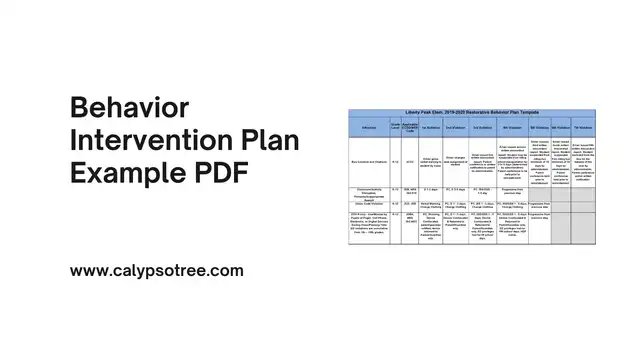Understanding the job description for a technical support specialist helps you know what to expect in this role. A Technical support specialist helps people with technical problems. They work in many industries to keep things running smoothly. This job is important because technology is everywhere.
Primary Duties OF Technical Support Specialist
A Technical Support Specialist does many important tasks each day. Here are some of the key duties:
- Fixing Technical Issues: They solve problems with computers, software, and other tech equipment. This means they help when something is not working right.
- Helping Customers: When people have trouble with their technology, they call or email the technical support specialist. It is the specialist’s job to listen to the customer, understand the problem, and provide a solution. They make sure the customer knows what to do to avoid the problem in the future.
- Keeping Records: They keep track of all the issues they solve. This means writing down what the problem was and how they fixed it. Keeping records helps in finding patterns in problems and helps in fixing similar issues faster next time.
- Using Tools: They use special software tools to help them do their job better. Some of these tools are Zendesk and TeamViewer. Zendesk is used to manage customer support tickets, and Team Viewer helps them control a customer’s computer from a distance to fix problems directly.
Each of these duties is important to make sure everything runs smoothly. They are like the doctors of the tech world, always ready to help fix what is broken and keep things working well.
Essential Skills
You need to know a lot about software and hardware. Here are the important skills you need:
- Technical Knowledge: You should understand how computers and software work. This includes knowing how to install and fix them.
- Troubleshooting Skills: This means you should be good at figuring out what is wrong with a computer or software.
- Communication Skills: You must be able to talk to people clearly. When a customer has a problem, you need to explain the solution in a way they can understand. Good communication helps solve problems faster.
- Problem-Solving Abilities: You should be able to solve problems quickly and efficiently.
Educational Requirements
Most people go to college and get a degree in Information Technology (IT). This means they study computers, software, and technology for several years. They learn how to fix and use different types of technology.
Some technical support specialists also get special certificates. These certificates are like awards that show they have learned extra skills. Two common certificates are CompTIA and Cisco.
- CompTIA: This certificate shows that the person knows a lot about computers and how to fix them.
- Cisco: This certificate shows that the person knows a lot about networks and how they work.
These certificates help them get better jobs because they prove they have extra knowledge and skills.
Learning never stops in this job. Technology is always changing and improving. New computers, software, and gadgets come out all the time.
The Benefits of Being a Technical Support Specialist
Here are some of the key advantages:
- Helping People: One of the best things about this job is helping people. When someone has a problem with their computer or software, you can fix it for them.
- Learning New Things: Technology is always changing, which means you are always learning.
- Good Job Opportunities: Many companies need technical support specialists.
- Career Growth: There are many ways to grow in this career. You can start as a junior technical support specialist and move up to senior technical support specialist or IT Manager.
- Job Security: As long as there are computers and technology, there will be a need for technical support tasks. This gives you job security because your skills will always be in demand.
- Flexible Work Options: Some technical support specialists can work from home.
- Problem-Solving: If you enjoy tech troubleshooting, Every day, you will face different challenges that require you to think and find solutions.
- Team Work: You often work with other IT professionals.
It offers many benefits that make it a rewarding and fulfilling career. You get to help people, learn new things, and have many opportunities for growth and job security.
Employment Industries
Technical support specialists can work in many different places. Here are some of the main industries where they are needed:
- Tech Companies: These are companies that make and use a lot of technology. They help keep their systems running smoothly.
- Healthcare: Hospitals and clinics use a lot of technology to take care of patients. They make sure all the tech equipment works properly.
- Finance: Banks and financial companies use computers for many tasks. They help fix any tech problems to keep things running smoothly.
- Education: Schools and universities use computers for teaching and administration. They ensure that all the tech tools work well.
Anywhere there are computers, They are needed. They help keep the technology working so everyone can do their jobs efficiently.
Work Environment
Technical support specialists usually work in offices. Here’s what their work environment is like:
- Office Setting: They have a desk, a computer, and other office supplies. They sit at their desks and help people over the phone or through email. They often talk to customers and solve problems while in the office.
- Remote Work: Some specialists can work from home, called remote work. They do the same job from their own house using a computer and phone. Remote tech support is convenient because there is no need to travel to an office each day.
- Working Hours: Sometimes, specialists need to work different hours because people might need help at any time.
If a computer breaks at night, someone still needs to fix it. This means they might work in shifts, with different groups working at different times.
Working in shifts ensures that someone is always available to help customers, no matter when they need assistance.
Common Software and Tools
Technical support specialists use many tools to do their job. Here are some important ones:
- Help Desk Software: This software helps them keep track of customer problems. An example is Freshdesk. It helps them organize and manage all the issues that need fixing.
- Remote Access Tools: These tools let them control a customer’s computer from far away. For example, AnyDesk lets them see the customer’s screen and fix problems without being there in person.
- Diagnostic Tools: These tools help them find out what is wrong with a computer problem solving or system. They can run tests and check for errors. This makes it easier to figure out the problem and fix it quickly.
Handling Customer Issues
When a customer has a problem, a Technical Support Specialist follows these steps to fix it:
- Talk to the Customer: First, they listen to the customer to understand the problem. They ask questions to get all the details.
- Find Out What is Wrong: Next, they use their skills and tools to figure out the cause of the problem. They might use diagnostic tools to check the computer or software.
- Fix the Problem: Once they know what is wrong, they fix it. This might mean repairing the software, replacing a part, or giving the customer tech help instructions on what to do.
- Check Back: After fixing the problem, they follow up with the customer. They make sure everything is working well and that the customer is happy.
Technical support specialists ensure that problems are solved and customers are satisfied. They make sure everything is working correctly before finishing the job.
Technical Support Specialist Career Path
Here’s how you can grow in this career:
Junior Technical Support Specialist
You start as a Junior Technical Support Specialist. This is an entry-level job where you learn the basics of helping people with tech problems.
Senior Technical Support Specialist
After gaining some experience, you can become a Senior Technical Support Specialist. In this role, you handle more complex issues and might help train new specialists.
IT Manager
With even more experience, you can move up to an IT Manager. As an IT Manager, you oversee a team of specialists and make sure everything in the IT department runs smoothly. You plan projects and help solve big problems.
Specializations
Some people choose to specialize in certain areas. For example, you might become an expert in network security, software development, or database management. Specializing can help you find a niche that you enjoy and excel in.
Staying Updated with Technologies
To stay good at their job, They need to keep learning. Here’s how they do it:
- Training Programs: They can take classes or courses to learn about new technologies. These programs help them stay up-to-date with the latest tech trends.
- Tech Conferences: They can go to tech conferences. At these events, they can learn from experts, see new products, and get new ideas.
- Professional Development: This means doing things to grow their skills and knowledge. They might read tech blogs, watch tutorials, or join professional groups. By doing this, they keep their skills sharp and learn new ones.
Challenges Faced
Here are some of the difficulties they face:
- Difficult Customers: Sometimes, customers can be upset or frustrated because their technology is not working. Specialists need to stay calm and patient while helping them.
- Fast-Changing Technology: Technology changes quickly. New software and devices come out all the time. Specialists need to keep learning so they can help with the latest tech.
- Staying Calm: When many problems come up at once, it can be stressful. Specialists need to stay calm and focused so they can solve each problem one at a time.
By handling these challenges well, They can be successful in their jobs and help people with their tech problems effectively.
Sample Job Description for a Technical Support Specialist
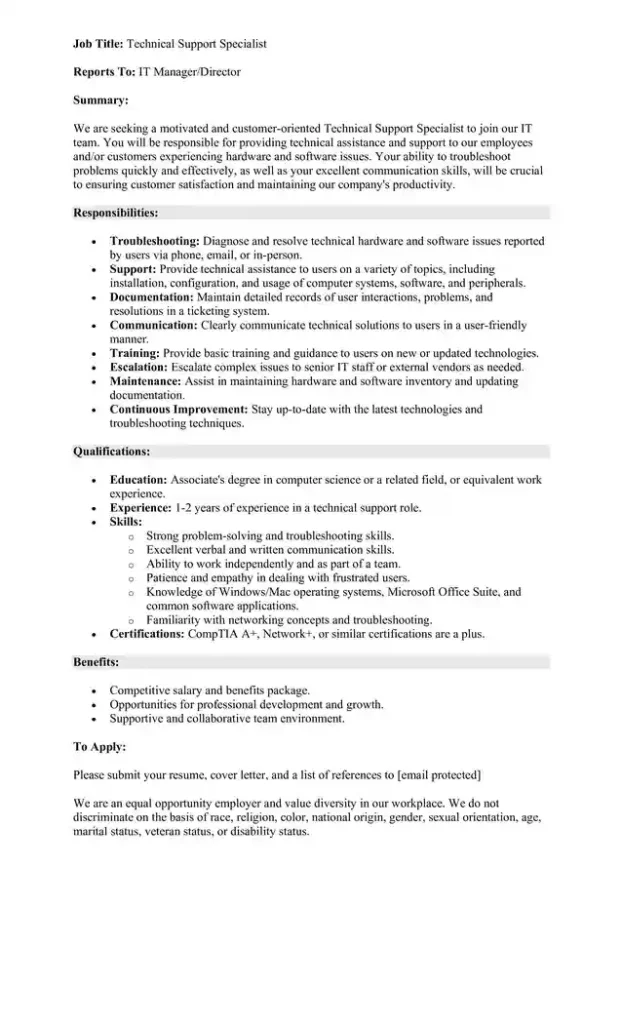
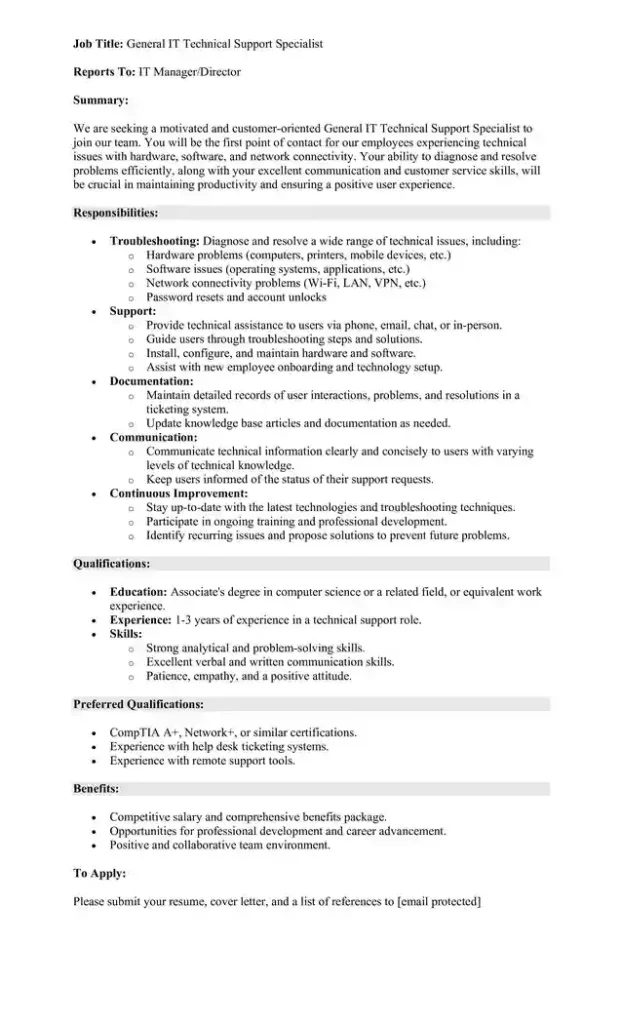
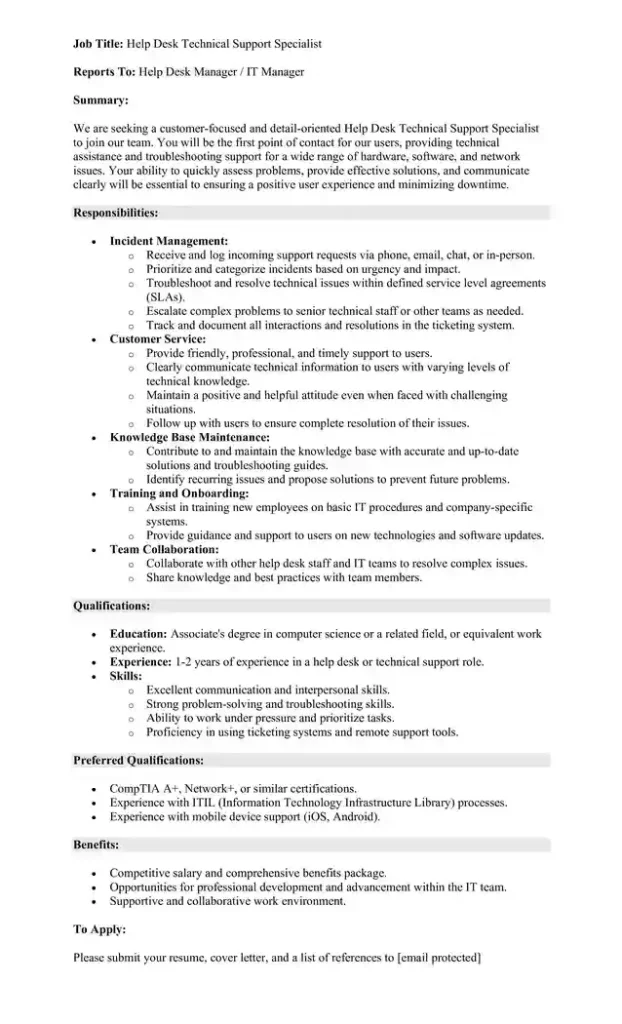
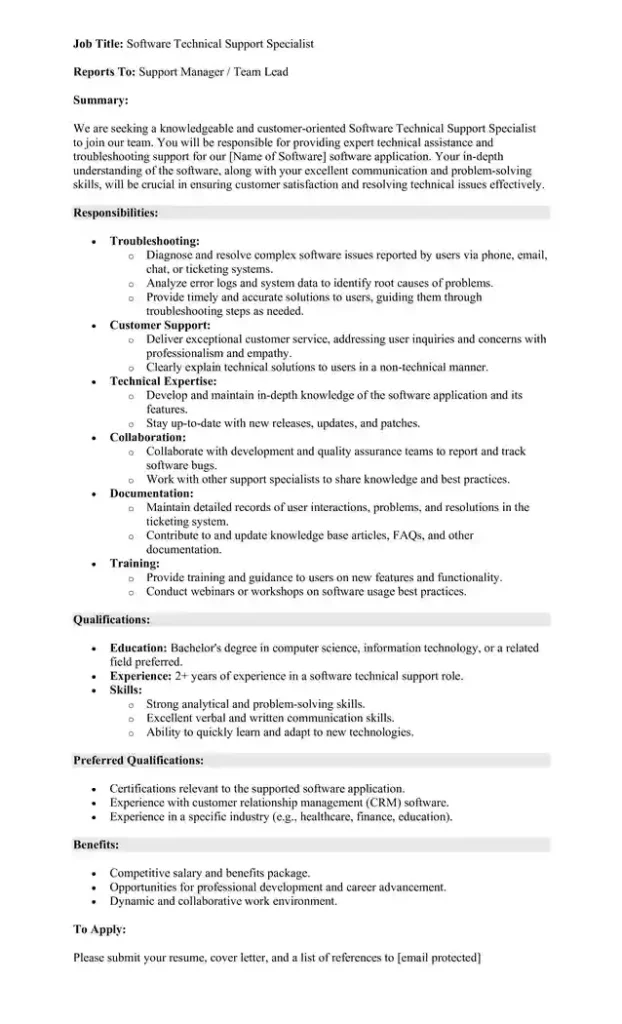
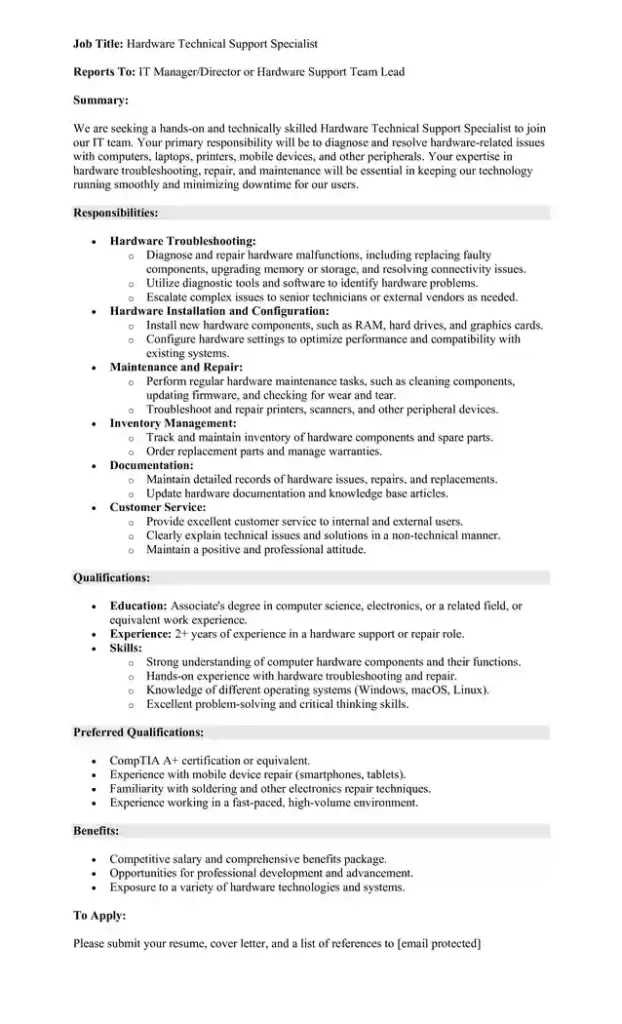
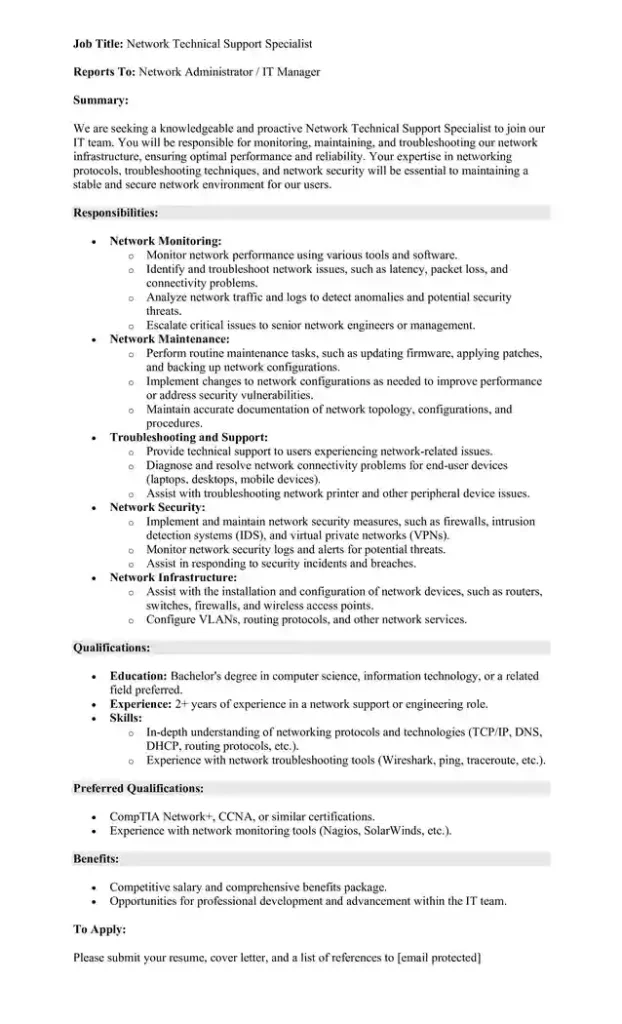
Technical Support Specialist Job Description Template
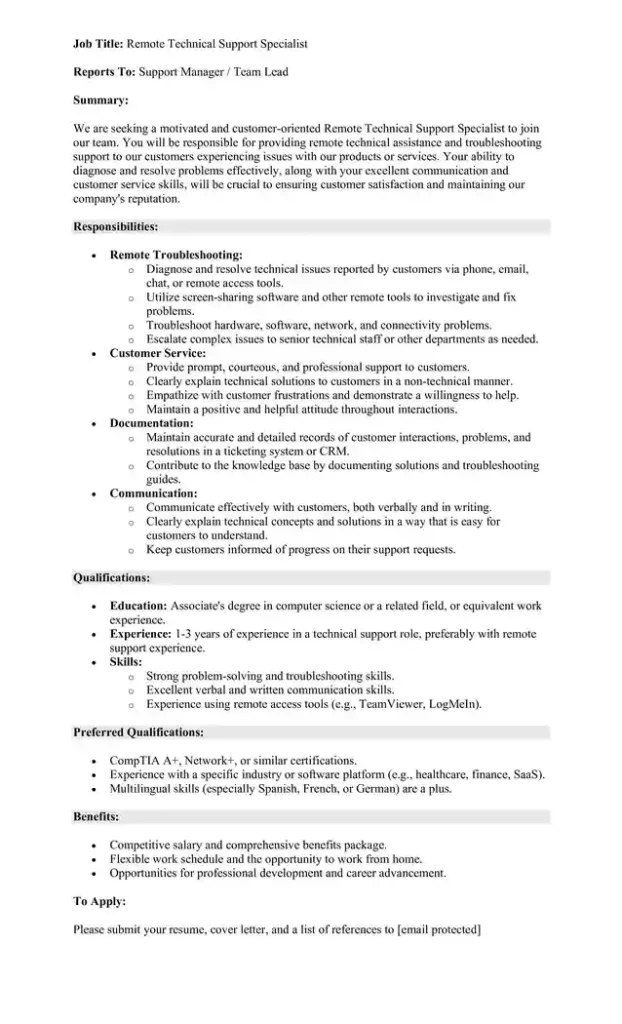
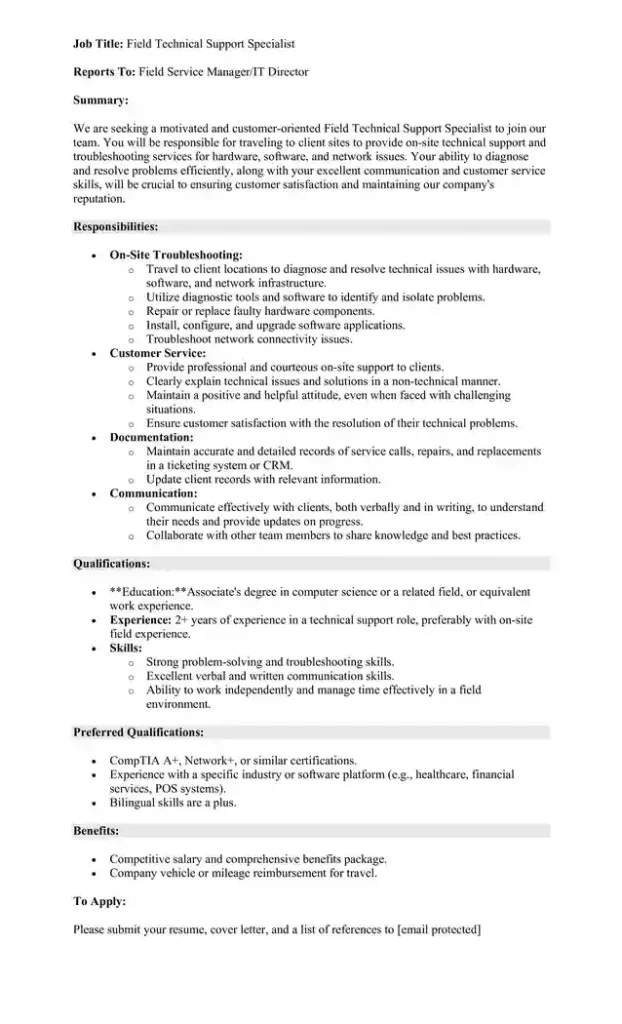
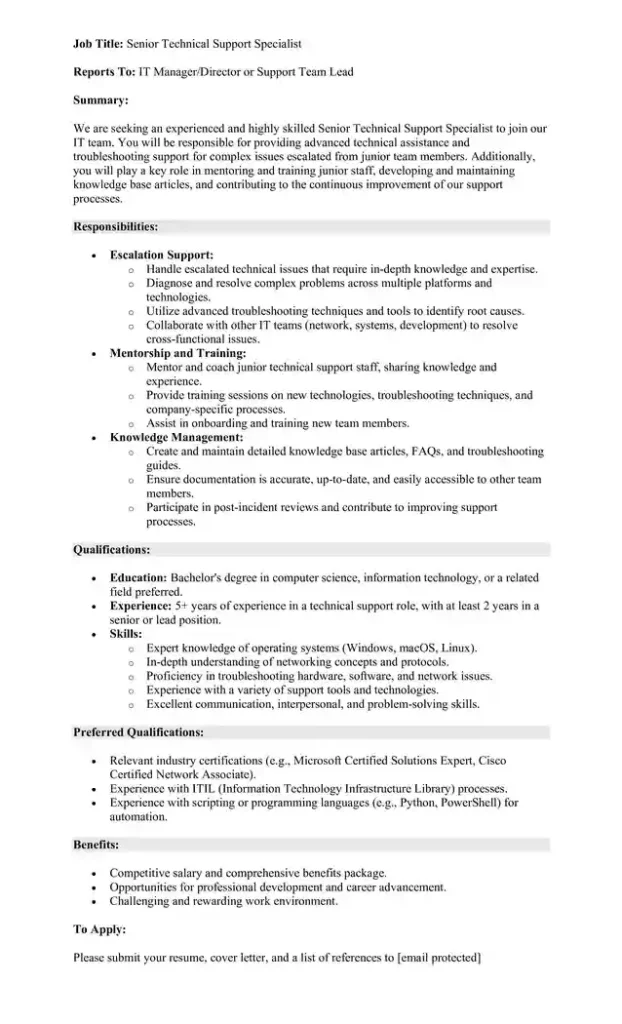
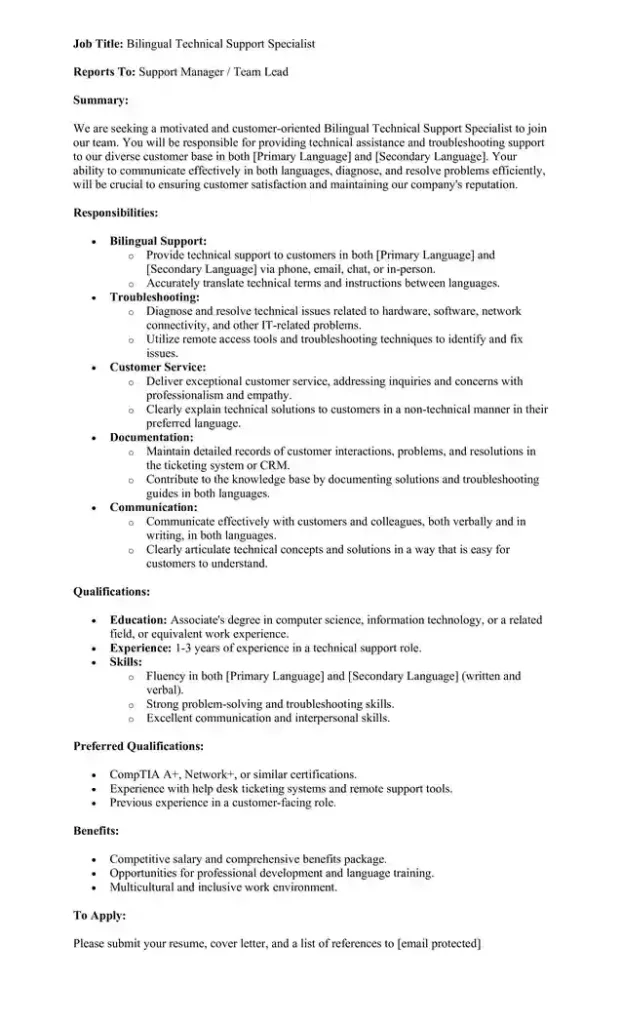
Technical support specialists are vital in today’s tech world. They solve problems and help people every day. The future looks bright for this job as technology keeps growing.
The job description for a Technical Support Specialist shows that it is a rewarding and fulfilling career.

Alexander is a skilled HR expert who writes clear and compelling job descriptions. He has spent over 15 years in the HR field, helping companies find and keep the best employees. With a degree in Human Resources Management from the University of Chicago, he has the knowledge to back up his experience.







